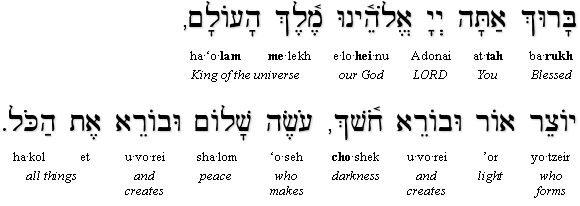|
Notice, however, that this traditional rendering actually deletes a parallelism that is important for understanding God's majestic power over all things, including evil (or calamity) itself.
The traditional blessing states that God yotzeir or v'vorei choshek (forms light and creates darkness, the first contrast) and continues with oseh shalom uvorei et hakol (who makes peace and creates all things). Now while this is undoubtedly true (and consonant with other teaching in Scripture), the verse from which this blessing derives actually says God oseh shalom uvorei ra (who makes peace and creates evil), indicating that the LORD is the Master of the universe, including being undisputed master over evil (ra). Indeed, the pasuk ends with the exclamation: ani Adonai oseh khol-eleh (I am the LORD who does all these things.)
It is significant that the Apostle Paul referred to the message to Cyrus when he was writing about God's sovereign purposes concerning Israel in his letter to the Romans.
So then he has mercy on whomever he wills, and he hardens whomever he wills. You will say to me then, "Why does he still find fault? For who can resist his will?" But who are you, O man, to answer back to God? Will what is molded say to its molder, "Why have you made me like this?" Has the potter no right over the clay, to make out of the same lump one vessel for honored use and another for dishonorable use? (Romans 9:18-21; Cp. Isaiah 45:9)
The Biblical view is that God is sovereign over evil, Ribbono shel Olam, the Master of the universe and all that is in it (including the fates of nations and individual people). However, since we know from other Scripture that God is not the author of (moral) evil (James 1:13), the translation of ra' should be qualified with the parallel word shalom, as the absence of peace, perhaps as "calamity" or "disaster" (Amos 3:6).
Without getting into the details of a sophisticated "theodicy" here, suffice it to say that the existence of evil in the universe is a mystery, since we know that even Judas, the very man who betrayed our beloved Mashiach and Savior of the world, was foreseen to have done so through God's forbearance and plan (Psalm 41:9, Mark 14:17-18, Acts 2:23). And regardless of the Job-like questions that sometimes haunt us while living in a "fallen" world, we are certain of God's goodness and love, as demonstrated by the glorious resurrection of Yeshua from the dead. God's power over the forces of evil is found in Yeshua's triumph over the kelalah (curse) of death.
A lot more could be said here, but let me finish this page with one final thought: Cyrus was a type of Messiah (he was literally called mashiach, "anointed") whom Adonai used to ransom captive Israel and return a remnant to Zion. Indeed, Isaiah writes:
"who says of Cyrus, 'He is my shepherd,
and he shall fulfill all my purpose';
saying of Jerusalem, 'She shall be built,'
and of the temple, 'Your foundation shall be laid.'"
(Isaiah 44:28)
Yeshua is indeed the Messiah (Matt 1:1, John 4:25-6, etc.), the Good Shepherd (John 10:11) who always did what the Father delighted in (John 8:29). He is the One who rebuilds the Temple made without hands (Mark 14:58, John 2:21, 1 Cor 6:19, 2 Cor 6:16, Eph 2:21, etc.) and is the True Foundation stone of all everlasting praise to God (1 Cor 3:11). Blessed be He.
|







